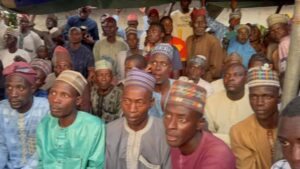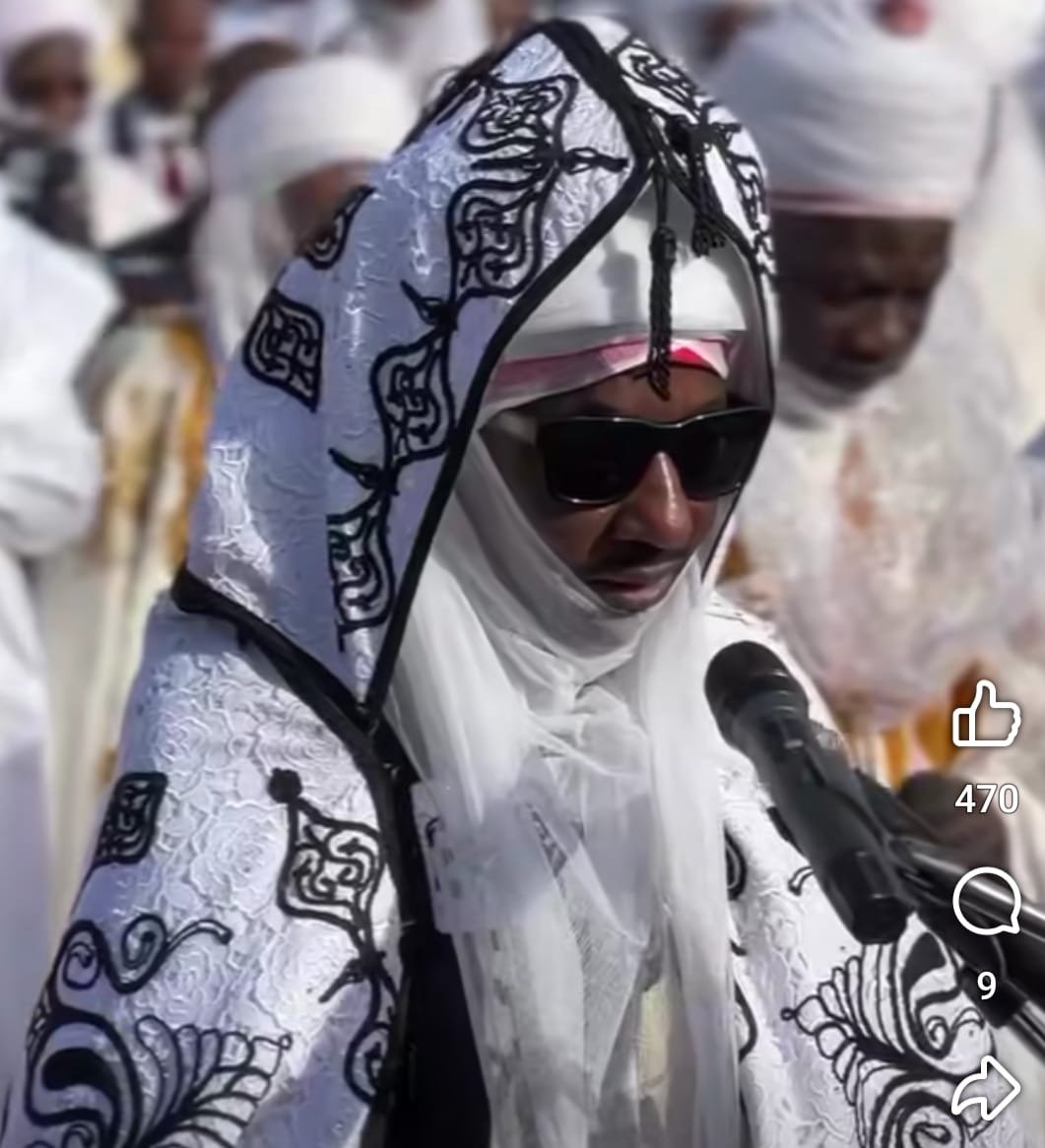Headlines
FG prosecutes 2,000 persons accused of corrupt practices – Malami

Nasiru Yusuf
The Attorney General of the Federation and Minister of Justice, Abubakar Malami said the Federal Government has prosecuted about 2,000 persons engaged in corrupt practices.
KANO FOCUS reports that Malami revealed this on Sunday while featuring on live programme ‘Baje kolin alheri’ on Radio Kano.
He said the accused under going trial would be brought to book to serve as a lesson for others to avoid squandering of public funds.
Malami said $311m were recovered from foreign countries looted by unpatriotic citizens, in addition to millions of Naira confiscated in the country.

The Minister explained that government is using legal mechanism and modern equipment to tackle insecurity bedveling some parts of the country.
Speaking on government policies on economy, the minister explained that the Federal Government had supported large number of traders, farmers and business men with at least N150,00 and N1,000,000 each as COVID-19 support programme to overcome the economic challenges.
The Minister pointed out that, tremendous achievements have been recorded on security in Northeast especially Borno. Construction of Abuja – Kaduna – Kano – Maiduguri roads among others as well as primary school feeding programme and resettlement of displaced persons in Borno state.

Barrister Abubakar Malami SAN
Why Buhari refused to sign electoral bill
The Attorney General of the Federation and Minister of Justice, Abubakar Malami, explained why president Muhammadu Buhari would not sign the new electoral bill that was recently returned to the National Assembly for amendment.
Malami stressed that signing such a bill into law would amount to excessive cost implication for political parties and government, aside the tendencies to frustrate the relative peace in the country.
members of the National Assembly have allowed only political inclination to override other national interest on the electoral bill.
Besides, the minister insisted that presidential assent on the electoral bill as it stands would only fuel litigation among other challenges rather than bring about solution in the electoral system.
The presidency had raised concern on the section of the bill that recommend direct primary system for political parties for selection of candidates to represent the party for election.
According to him, “What you should understand about leadership of the country, most especially, as it regards President Muhammadu Buhari on any law presented to him for signing, the president is entitled to certain rights.
“When you talk about politics he has rights, if you talk about economy the business community also have rights on him, if you are talking about 60 per cent of Nigerians that are not politicians, if you talk about the economy he also has rights, if you are talking about security, there is also what is expected from him. The president has to consider laws that are sustainable.
“The job of the president is that of politics, economy, business, security, legislations, politicians and non politicians. This is because the leadership of the country is not for the politicians alone, it is a leadership that affects social life of the people, their religion, economy, security and others. This is contrary to the leadership of the legislators which is solely political.
“Any bill signed into law by President Muhammadu Buhari is in the interest of all Nigerians irrespective of their inclinations. He is after satisfying the interest of the over 200 million Nigerians he is serving and not a particular sector.”
He further spoke on the financial burden in the new electoral bill not signed by the president.
“For example, one of the reasons is that there are 18 political parties and a law is founded that will allow for direct primaries. The difference between this and the general election is small because it allows for all Nigerians to come about and say their opinions.
“This means that you will repeat the general elections 18 times. Today Independent National Electoral Commission (INEC) requires N305 billion for the 2022 general elections. Now if the general election, which is not the newly proposed electoral system, will cost this much, how much will it cost to do the same election in the APC? It might cost at least N200 billion because it will involve everyone. Although the good side of the law is that INEC is required to monitor it.
“Therefore if it is assumed that every political party will will spend N200 billion, how much will then be spent in conducting the same primary election in 18 political parties just to produce a qualified candidate?
“Let’s assume there are about 60 million politicians in the country, what about the remaining over 160 million Nigerians who have nothing to do with politics? Are you fair to them? All the people want are good projects, good road from Abuja to Kano, portable drinking water, good education, school feeding programme and the rest of them. Are you fair to the 160 million Nigerians using their wealth just to conduct primary election to produce a party candidate, despite other demands by the public?
“My answer to this is that, to spend this N305 billion that will be given to the INEC and the about N200 billion to be given to the political parties is not fair to the remaining 160 million Nigerians who have no business about politics and political appointments. Their business is just a better life in Nigeria. This is the issue of cost implications,” Malami said.

Headlines
Edo, Kano Governors Visit Torankawa Community, Assure Justice for Uromi Victims

Kano State Governor, Alhaji Abba Kabir Yusuf, alongside his Edo State counterpart, Governor Monday Okpebholo, on Monday visited the Torankawa community in Kano to commiserate with the families of the 16 victims brutally killed in Uromi, Edo State.
The visit, which brought together key government officials and community leaders, was aimed at reassuring the affected families of the government’s commitment to securing justice and providing necessary support.
In a statement issued by his spokesperson, Sanusi Bature Dawakin Tofa, Governor Yusuf expressed deep sorrow over the tragic loss and reiterated his demand for the swift prosecution of those responsible.
He also emphasized the importance of ensuring that similar incidents do not occur in the future.

“This visit is not just about condolence; it is about reaffirming our commitment to justice. The families of these victims deserve more than words—they deserve action. We will not rest until every perpetrator is brought to book, publicly paraded, and held accountable,” Governor Yusuf stated.
He further urged the Edo State Government to expedite the promised compensation for the victims’ families, emphasizing that the loss of breadwinners had left many households in distress.
On his part, Governor Okpebholo extended his heartfelt condolences, assuring the families that his administration was working tirelessly with security agencies to ensure justice is served.
“I want to personally assure you that we are treating this case with the urgency it deserves. Edo is home to all Nigerians, and this kind of violence will not be tolerated. The security agencies have made significant progress, and I assure you that justice will be swift,” Governor Okpebholo said.
Community leaders in Torankawa expressed gratitude for the visit, acknowledging that it had helped ease tensions and restore confidence in the government’s commitment to their welfare.
Governor Yusuf reaffirmed that his administration would continue to follow up on the case until justice is fully served.
In his response, His Highness Amb. Muhammad Isa Umar, the emir of Kano on behalf of the community, appreciated the two Governors for thier proactiveness in handling the unfortunate incidence.

Headlines
Edo Killings: Gov Okpebholo visits Kano, pledges compensation for travelers

Edo Killings: Gov Okpebholo visits Kano, pledges compensation for travelers
Nasiru Yusuf Ibrahim
Governor Monday Okpebholo, accompanied by Governor Abba Kabir Yusuf, paid condolence visit to the families of the 16 northern travelers killed in Uromi, Edo State.

KANO FOCUS reports that youths and women on Monday took to the streets in Bunkure Local Government Area, welcoming the visiting governor accompanied by governor of Kano.
At Torankawa, Governor Okpebholo assured the families that compensation would be provided and reiterated his commitment to ensuring that justice is served.

On his part, Governor Yusuf pledged cash assistance and food supplies to the affected families, though he did not specify the exact amounts or quantities.
Both governors reaffirmed their commitment to ensuring that the perpetrators are brought to justice and that such incidents do not occur again.

Headlines
Emir Sanusi II Warns Against Internal Betrayal and External Meddling in Kano

Mukhtar Yahya Usman
In a fervent Eid-el-Fitr sermon at Kofar Mata Eid Ground the Emir of Kano, His Highness Muhammadu Sanusi II, delivered a stern sermon prayer to individuals within Kano collaborating with external forces to destabilize the city’s peace and stability.
He decried such acts of betrayal and disloyalty, urging the populace to remain vigilant and united against these threats.
The Emir condemned those conspiring with outsiders to foment unrest in Kano, asserting that divine justice would prevail upon them. He said.
“There are people among us who have sold their conscience, joining hands with outsiders to threaten the peace of Kano. Let me remind them—Allah (SWT) will deal with them just as He dealt with those who betrayed Prophet Muhammad (SAW) in his time.”

These emphatic remarks come amid escalating political tensions, with reports of external interference in Kano’s traditional and governance structures.
The Emir urged citizens to dismiss provocations, remain steadfast in prayer, and stay alert to the machinations of traitors.
He emphasized that Kano’s strength lies in its unity and cautioned that anyone plotting against the state would face both divine and communal repercussions.
Concluding his sermon, the Emir invoked Allah’s protection over Kano and called on the people to remain resolute in faith and resistance.
He implored, “May Allah expose and disgrace those who conspire against our peace. May He strengthen the righteous and silence the voices of division.”














